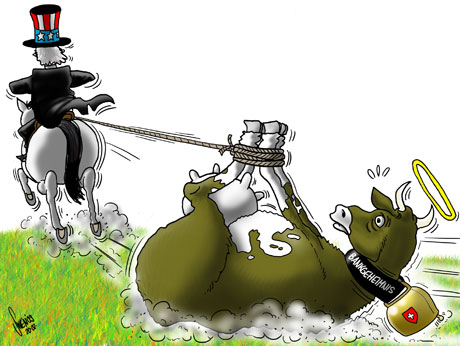Cabinet moots further easing of banking secrecy

The government has launched a lengthy process to grant cantonal authorities access to bank client data in a bid to crack down on suspected tax evasion. The move could lead to a further weakening of traditional banking secrecy rules.
More than three years after Switzerland loosened banking secrecy in line with international standards, the cabinet on Friday decided to reform the criminal law on tax issues.
Switzerland currently allows domestic authorities access to bank accounts only in cases of suspected fiscal fraud. However, tax evasion – when citizens fail to declare their income or wealth – is considered merely a civil offence and is punished by a fine.
The finance ministry has been mandated to present a detailed draft by next spring which will then be submitted to political parties, organisations and pressure groups. At a later stage parliament is discuss the proposals.
The reform of the penal law is aimed at eliminating loopholes and simplify and streamline the tax system, according to a cabinet statement.
Experts say the reform could also create a level playing field between foreign and domestic tax authorities trying to crack down on tax cheats.
The announcement met mixed initial reaction from the main political parties, the cantons and the banking industry.
The rightwing Swiss People’s Party vowed to fight against an easing of banking secrecy, the centre-right Radicals and Christian Democrats warned against lifting the distinction between tax fraud and tax evasion. The centre-left Social Democrats for their part welcomed the plan as step in the right direction.
The 26 cantons, which have wide-ranging autonomy, also came out in favour, while the Swiss Bankers Association warned of putting tax fraud and tax evasion on the same level.
OECD standards
Under growing international pressure on tax havens, the cabinet in March 2009 agreed to abolish the distinction between tax fraud and tax evasion in line with the Organisation for Economic Co-operation and Development (OECD), paving the way for the exchange of information with other countries in individual cases and based on legal requests.
Over the past few years, Switzerland has re-negotiated more than 40 double taxation accords with other countries.
Tax issues have been high on the agenda in talks with the United States but also with neighbouring Germany, France and Italy as well as with the biggest Swiss trading partner, the European Union.
The weakening of Swiss bank secrecy has been a big blow to the world’s largest offshore centre with $2 trillion (SFr1.86 trillion) in assets.
The country’s largest bank, UBS, said it expects Swiss banks to see European clients withdraw “hundreds of billions of francs” as a result of steps to stop foreigners using secret accounts to evade taxes.
People wishing to dodge paying taxes on their assets can do so by three means: avoidance, evasion and fraud.
Avoidance is the legitimate means of structuring finances so they don’t fall under the scope of taxable assets. This can be done, for example, by setting up a trust fund or by changing country residence or nationality.
Evasion is the deliberate concealing the true state of assets from the tax authorities – in other words, lying about the extent of your assets. This is a civil offence in Switzerland and some other countries, but criminal in most states.
The main distinction between evasion and fraud is that the perpetrator tells lies on official documentation. Unless tax fraud can be proved, Swiss banks are not obliged to hand over details of client assets to investigators. In some cases this information is needed before fraud can be established in the first place.

In compliance with the JTI standards
More: SWI swissinfo.ch certified by the Journalism Trust Initiative





You can find an overview of ongoing debates with our journalists here. Please join us!
If you want to start a conversation about a topic raised in this article or want to report factual errors, email us at english@swissinfo.ch.